- Home
- Nick Hornby
An Education Page 3
An Education Read online
Page 3
Lone, Carey, Dominic and I go onstage for the Q&A - the people who’ve stayed for it seem genuinely taken by the film, which is a relief. Afterwards, I go outside to smoke round the back of the cinema, and Lone, our Danish director, introduces me to a compatriot, a woman who is a juror on the awards panel.
‘Hello,’ I say. ‘I hope you enjoyed it.’
I know she’s a juror, but it wouldn’t kill her to lie politely, I think.To tell a screenwriter that you enjoyed his film is not the same thing as telling him that you will shower him with prizes.
‘I cannot tell you that,’ she says firmly.
‘Oh.’
I try to think of another pleasantry that will not compromise her obviously formidable integrity.
‘Well . . . Thanks for coming.’
‘I had no choice,’ she says, but she still seems to expect a chat.
I shrug helplessly. ‘I’ve got nothing left,’ I tell her. She walks away.
I check my phone to see if Serge has left a message about Monica going into labour, and it turns out that they came to the screening but couldn’t get anywhere near it. The tickets we had worked hard to get them were useless. There’s another message from Scott, one the co-writers of 500 Days of Summer. His tickets were no good either. We only invited four friends, and none of them got inside the cinema.
One of the points - the chief point - of premiering the film at Sundance is to try and sell the film to an American distributor. An Education was made without any distribution already in place, which means that there was no guarantee that anyone would ever see it in a cinema, a fate that befalls a surprisingly large number of movies. To our delight, we had sold it for UK release shortly before the festival, but the US financiers need American distribution. It’s not our problem, but of course we all want it, too: it’s been made for people to watch, on a big screen. Everything I had read in the trade press about Sundance in the run-up to the Festival contained dire warnings about the economy’s impact on sales; nobody was expecting much to happen. Our sales agents were confident that they’d get something, but they thought it would take time, that distributors would need to see all the movies before committing themselves to one or two. We were prepared not to hear anything for a week or two. But when we get to the strange and rather cheerless village hall that is our post-film party venue, we hear that an offer has already been made. We are jubilant. It turns out that it is a very bad offer - insulting, even, if you know enough to be insulted, which I don’t. So I remain jubilant, like an idiot.
At the party I am introduced to David Carr, whose brilliant memoir Night of the Gun was one of my favourite books of last year: he wants to speak to me for his New York Times blog. It doesn’t seem right. The book is so great that I feel I should be interviewing him.
He starts with an apology.
‘I’m sorry,’ he said. ‘I had to leave your film halfway through. I was called out to interview Robert Red-ford. ’ The man who didn’t come back was David Carr, author of Night of the Gun! And he had a good excuse anyway! I can now account for 100 per cent of the leavers: two weak bladders (or in Carey’s case, completely understandable nerves) and a summons from a megastar.
When we get back to the hotel late that night, Amanda tells me that there is quite a lot going on: the insulting offer has been superseded by several less insulting offers. Distributors liked the film, and some of them want to buy it.
Monday, 19 January
Lone, Carey, Dominic and I have a day of publicity. It becomes apparent quite quickly that Carey’s life has changed this weekend; her other film ended up getting mixed reviews, but her performance was praised to the skies, and everybody loves her in ours, too - which is just as well, seeing as she’s in every single scene.Within twenty-four hours she’s being described as the Sundance ‘It’ Girl in Variety, and ‘the new Audrey Hepburn’ in the NewYork Post. It’s exciting to watch - like something out of an earlier, more glamorous age. As we walk through the Park City streets from appointment to appointment, several people want their photographs taken with her. She remains remarkably composed throughout the weekend. She’s a very bright girl, and I am certain that she will be able to handle this year with grace and charm.
Lone and I are interviewed together by a young woman from a news agency. For some reason, the news agency has positioned itself for the duration of the festival on the second floor of a guitar shop, in what looks like a broom cupboard; underneath them, rock bands are playing short, loud sets. It’s as if they have deliberately chosen the worst spot in Utah for recorded interviews. It takes us about half-an-hour to push through the music fans to the cupboard, and when we get inside it, it’s obvious that the young woman hasn’t emerged to see any films.
‘Tell us about your characters,’ is her opening shot.
‘Lone’s very calm,’ I tell her. ‘But I can be moody.’ She looks confused.
‘We’re not actors,’ I confess.
Flustered, she consults her notes.
‘It must be hard, working together when you’re married. Was there any tension?’
‘We’re not married,’ says Lone. Still. Where would we be without the press?
In the evening, Carey, Amanda, Finola and I go to see another film, and then attend yet another party. I think I have been to more parties here than in the whole of 2008. By now it’s obvious that things have gone much better for us than we dared hope: the reviews we’ve seen have been unbelievable (one of the first, on the normally snarky ‘LA gossip rag’ Defamer.com, I wouldn’t have dared write myself), the film is almost certainly going to sell for a decent amount, and to cap it all, here I am giving Uma Thur-man a light. I don’t have a lighter, so I hand her my cigarette. (I can only just reach - she’s about a metre taller than me.)
‘If you can live with the intimacy that implies,’ she says.
And then I woke up.
I am always on the verge of giving up smoking, but my habit has resulted in my meeting both Uma (as I now think of her) and Kurt Vonnegut. Where’s the incentive?
Amanda and Finola sign an agreement with Sony Picture Classics in the Virgin lounge at the San Francisco airport. When we get home we are told that An Education won the Audience Award and a prize for John de Borman’s cinematography. Nothing from the Danish juror, though.
CAST AND CREW
Cast (in order of appearance)
Jenny CAREY MULLIGAN
Miss Stubbs OLIVIA WILLIAMS
Jack ALFRED MOLINA
Marjorie CARA SEYMOUR
Graham MATTHEW BEARD
David PETER SARSGAARD
Hattie AMANDA FAIRBANK-HYNES
Tina ELLIE KENDRICK
Danny DOMINIC COOPER
Helen ROSAMUND PIKE
Headmistress EMMA THOMPSON
Sarah SALLY HAWKINS
Nightclub Singer BETH ROWLEY
BBC FILMS PRESENTS
IN ASSOCIATION WITH ENDGAME ENTERTAINMENT
A WILDGAZE FILMS / FINOLA DWYER PRODUCTION
A FILM BY LONE SCHERFIG
Casting Director LUCY BEVAN Line Producer CAROLINE LEVY Music Supervisor KLE SAVIDGE
Makeup & Hair Designer LIZZIE YIANNI GEORGIOU Costume Designer ODILE DICKS-MIREAUX
Music by PAUL ENGLISHBY
Editor BARNEY PILLING
Production Designer ANDREW MCALPINE Director of Photography JOHN DE BORMAN BSC Executive Producers JAMES D. STERN, DOUGLAS E.
HANSEN, WENDY JAPHET, DAVID M. THOMPSON, JAMIE LAURENSON, NICK HORNBY
Based on a Memoir by LYNN BARBER
Screenplay by NICK HORNBY
Produced by FINOLA DWYER & AMANDA POSEY Directed by LONE SCHERFIG
AN EDUCATION:
The Screenplay
1 INTERIOR: SCHOOL - DAY
Montage: A nice girls’ school in a south-west London suburb.We see girls doing what girls did in a nice girls’ school in 1961: walking with books on their heads, practising their handwriting, making cakes, playing lacrosse, dancing with e
ach other.
2 INTERIOR: CLASS ROOM - DAY
In one of the classrooms, MISS STUBBS, an attractive, bright, animated schoolteacher, is talking to a small group of sixteen-year-old girls. Some of these girls seem to be daydreaming - looking out of the window, examining their fingernails. A couple, including a bespectacled girl (ANN), who looks five years younger than everyone else in the class, write down everything the teacher says. Only one, JENNY, beautiful and as animated as her teacher, seems to be listening in the spirit in which MISS STUBBS would like her to listen. She’s smiling, eyes shining - she loves MISS STUBBS and these lessons. MISS STUBBS asks a question and looks at the girls for a response.
MISS STUBBS
Anybody? . . .
JENNY puts up her hand - the only person in class to do so.
Anybody else? . . .
No one else reacts.
(mock-sighing)
Yes. Jenny . . .
JENNY
Isn’t it because Mr Rochester’s blind?
3 INTERIOR: JENNY’S HOUSE - DAY
Title: TWICKENHAM, LONDON 1961
JENNY, her mother and her father are finishing Sunday lunch. Jenny’s father, JACK, is in his forties; MARJORIE, her mother, is slightly younger than JACK, but every bit as middle-aged.The food is grey and brown, in keeping with the colour scheme of the house.They aren’t talking - they’re listening to Mantovani on the radio. JENNY gets up from the lunch table.
JENNY
I’ve got an English essay to do by tomorrow morning.
JACK
Right. So, the only sound I want to hear coming through the ceiling this afternoon is the sound of sweat dripping onto textbooks.
JENNY
Cello?
JACK
No cello.
JENNY
I thought we agreed that cello was my interest or hobby.
JACK
Well, it already is your interest or hobby. So when they ask you at the Oxford interview ‘What is your interest or hobby?’ you can say, ‘The cello’ and you wouldn’t be lying. But you don’t have to practise a hobby. A hobby is a hobby.
JENNY
Can I stop going to the youth orchestra, then?
JACK
No, no, no. The youth orchestra’s a good thing. Shows you’re a joiner-inner.
JENNY
Ah.Yes. But. I’ve already joined in. So now I can stop.
JACK
No, no. Well, that just shows the opposite, don’t you see? That shows you’re a rebel. They don’t want that at Oxford.
JENNY
No. They don’t want people who think for themselves.
JACK
(missing the sarcasm, as is his wont)
’Course they don’t.
4 INTERIOR: SCHOOL HALL - DAY
JENNY with cello sits in the string section. Everyone is getting settled, tuning up, latecomers still arriving. Along the row from JENNY, tuning his violin, is a nice-looking boy of her age, GRAHAM, and she waves at him.Two thirteen-year-old boys sitting between them wave, too, parodically, and then blow kisses, much to GRAHAM’S embarrassment and JENNY’S fury.
The silly boys dissolve in fits of giggles: this is clearly one of the funniest moments of their lives - until one of them farts noisily and, it would appear from all the frantic gesturing, pungently. The comic value of the fart tops even the comic value of the wave, and they are scarcely able to stay seated, such is their mirth.
5 EXTERIOR: SCHOOL - DAY
JENNY and GRAHAM are talking while he struggles to take his bike out of a bicycle rack, slightly unbalanced by the violin strapped to his back. GRAHAM is ner vous, chronically unconfident and shy.
GRAHAM
Should I wear, you know, Sunday best?
JENNY
You’d better, I’m afraid. Just to show my father you’re un jeune homme serieux, not a teddy boy.
GRAHAM
Oh, God.
JENNY
(looking up at the sky)
I’m going to go. It’s going to bucket down in a minute.
GRAHAM
Oh, OK, right . . .
JENNY
I’ll see you at the weekend.
GRAHAM
Bye, then.
JENNY
Bye.
They move at the same time and bump awkwardly into each other.
JENNY/GRAHAM
Sorry.
The two silly boys from before are sitting on the school wall and start to blow more kisses.
SMALLER BOY 1
Goodbye, my love!
GRAHAM blushes as he and JENNY head off in opposite directions.
6 EXTERIOR: BUS STOP - DAY
The rain has begun. JENNY attempts to cover herself. A mother pushing a pram and holding the hand of her little boy crosses the road in front of her, and a beautiful, sleek red sports car - a Bristol - stops to let them across. DAVID, possibly in his mid-thirties, dapper, and almost but not quite handsome, is driving the car. DAVID, distracted, impatient, spots JENNY at the bus stop.
In front of the car a small Wellington boot drops off the foot of the boy, further slowing down their painfully slow progress across the road.
JENNY is wet. DAVID makes eye contact. JENNY smiles ruefully and enchantingly. Once the mother and boy have crossed the road, DAVID pulls the car over by the bus stop and rolls the window of the Bristol down.
DAVID
Hello.
JENNY ignores him.
Look. If you’ve any sense, you wouldn’t take a lift from a strange man.
JENNY smiles thinly.
But I’m a music lover, and I’m worried about your cello. So what I propose is, you put it in the car and walk alongside me.
JENNY
How do I know you won’t just drive off with the cello?
DAVID
Ah. Good point. How much does a new cello cost? Ten pounds? Fifteen? I don’t know. Let’s say fifteen.
He pulls out a wallet, takes out three five-pound notes, hands them to her.
JENNY laughs and waves the money away.
No? All right . . . Up to you.
DAVID gets out of the car to help Jenny with the cello.
I’m David, by the way.
JENNY
(hesitates)
Jenny.
DAVID
Very good.
He gets back in the car.
7 EXTERIOR: STREET, NEAR SCHOOL - DAY
Moments later.The cello is in the backseat of the Bristol. JENNY is trotting alongside the car, while DAVID leans nonchalantly across the passenger seat to talk to her while driving.
DAVID
How did the concert go?
JENNY
It was a rehearsal. The concert’s next Thursday.
DAVID
What are you playing?
JENNY
(making a face)
Elgar.
DAVID
Ah, Elgar. I think it’s a shame he spent so much time in Worcester, don’t you? Worcester’s too near Birmingham. And you can hear that in the music. There’s a horrible Brummy accent in there, if you listen hard enough.
JENNY looks at him and smiles. She hadn’t expected him to be able to make Elgar jokes.
Anyway, Elgar and the Jews don’t mix very well.
JENNY
I’m not a Jew!
DAVID
(laughing)
No. I am. I wasn’t . . . accusing you.
JENNY
Oh. (She smiles awkwardly.) Can I sit in the car with my cello?
DAVID stops the car.
DAVID
Jump in.
8 INTERIOR: DAVID’S CAR - DAY
JENNY shuts the door and sinks approvingly into the leather seat. DAVID regards the dripping girl with amusement.
JENNY
I have never seen a car like this before. C’est très chic.
DAVID
It’s a Bristol. Not many of ’em made.
JENNY struggles for
something to say.
JENNY
Oh.
DAVID
Where to, madam?
JENNY makes a face.
JENNY
I only live round the corner. (She pauses.) Worse luck.
DAVID
I’ll see what I can do.
DAVID changes gear to slow the car down.

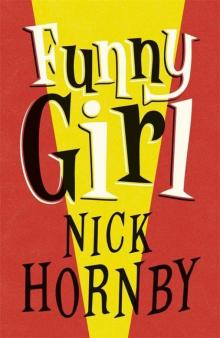 Funny Girl
Funny Girl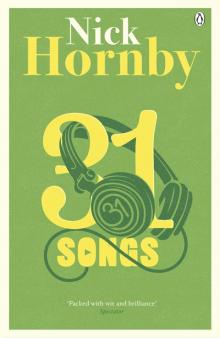 31 Songs
31 Songs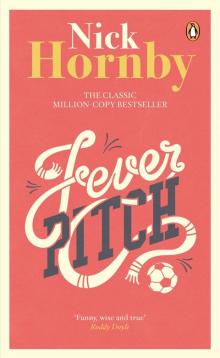 Fever Pitch
Fever Pitch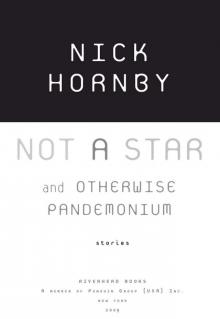 Not a Star and Otherwise Pandemonium
Not a Star and Otherwise Pandemonium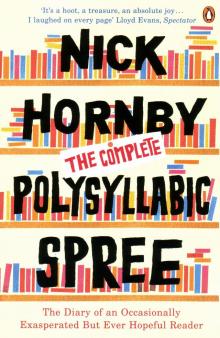 The Complete Polysyllabic Spree
The Complete Polysyllabic Spree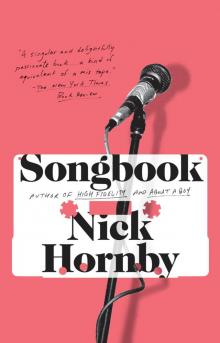 Songbook
Songbook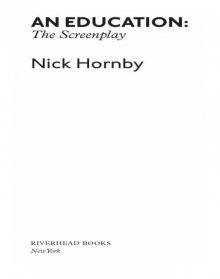 An Education
An Education Slam
Slam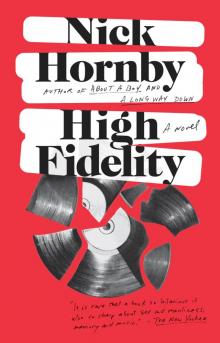 High Fidelity
High Fidelity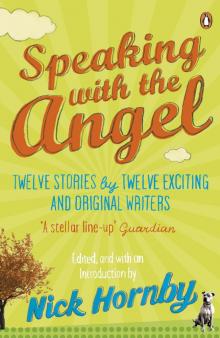 Speaking With the Angel
Speaking With the Angel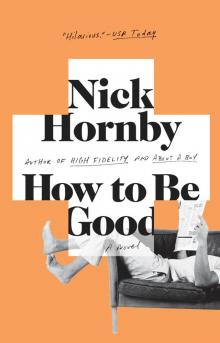 How to Be Good
How to Be Good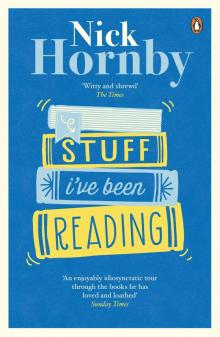 Stuff I've Been Reading
Stuff I've Been Reading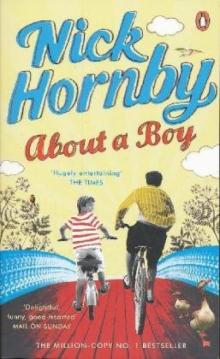 About a Boy
About a Boy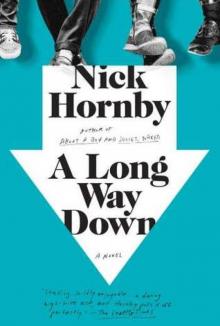 A Long Way Down
A Long Way Down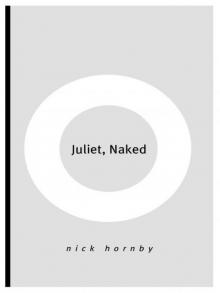 Juliet, Naked
Juliet, Naked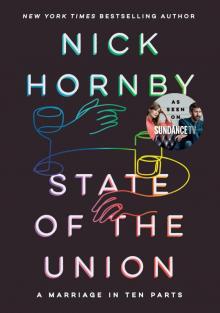 State of the Union
State of the Union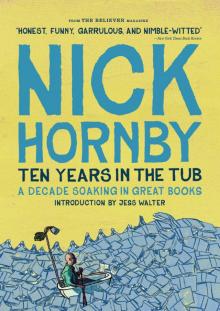 Ten Years in the Tub: A Decade Soaking in Great Books
Ten Years in the Tub: A Decade Soaking in Great Books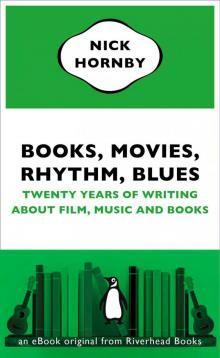 Books, Movies, Rhythm, Blues: Twenty Years of Writing About Film, Music and Books
Books, Movies, Rhythm, Blues: Twenty Years of Writing About Film, Music and Books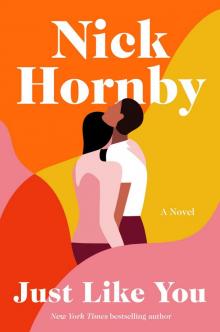 Just Like You
Just Like You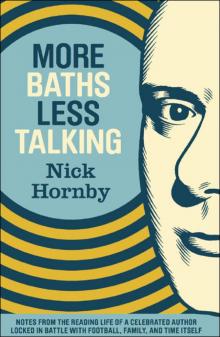 More Baths Less Talking
More Baths Less Talking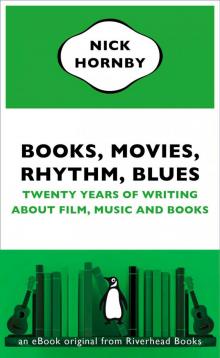 Books, Movies, Rhythm, Blues
Books, Movies, Rhythm, Blues